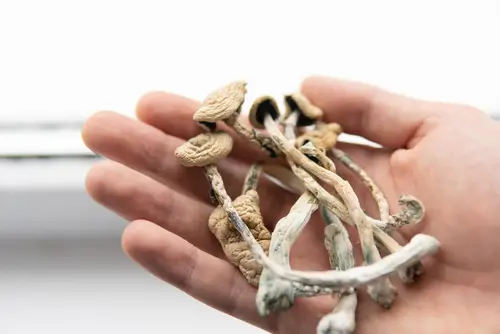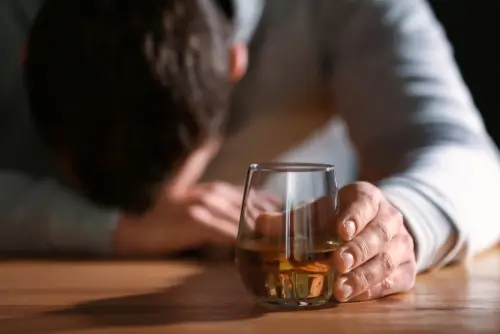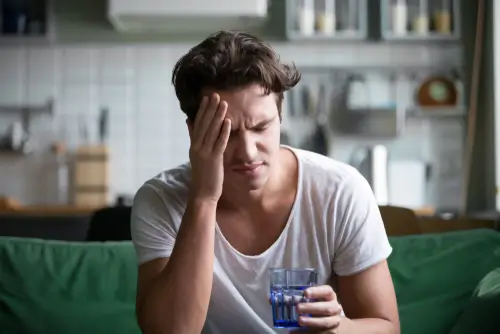Alcohol and shrooms, or psilocybin mushrooms, are two distinct psychoactive substances that have captured the curiosity of many individuals. According to the 2021 National Survey on Drug Use and Health, 133 million individuals used alcohol, with 60 million engaging in binge drinking. According to the same data, 7.4 million individuals used some form of hallucinogen in 2021. With a total of 140.4 million individuals being affected by alcohol and shrooms, understanding the effects, interactions, and risks of combining the two is essential.
In this article, we will look at the effects of alcohol and shrooms, why individuals may combine the two, the risks of mixing the substances together, and how to treat a mushroom and alcohol addiction.
Understanding Alcohol & Shrooms
Before diving into the effects, risks, and interactions of mixing alcohol and shrooms, we first need to look at alcohol and shrooms individually. This allows us to understand how the effects of each substance change when combined with one another. By isolating the effects of each substance, we can gain insights into their unique characteristics, mechanisms of action, and physiological impacts. This insight then enables us to approach the combination with more caution and education about the potential dangers.
Learn More: What is Polysubstance Abuse?

What are the Effects of Alcohol?
Alcohol, also known as ethanol, is a widely consumed psychoactive substance that affects the central nervous system. While alcohol can initially produce pleasurable and relaxing effects, it is essential to understand its potential risks and consequences. Some of the most common side effects of alcohol consumption can include:
- Impaired cognitive function
- Memory loss
- Increased risk-taking behavior
- Dehydration
- Nausea or vomiting
- Increased heart rate
- Liver damage
What are the Effects of Shrooms?
Shrooms, also known as magic mushrooms or psilocybin, are hallucinogenics that can cause mind-altering psychedelic effects on the body and mind. Psilocybin (4-phosphoryl oxy-N, N dimethyltryptamine), the main ingredient in shrooms, is responsible for the hallucinogenic effects that are produced after consuming shrooms. While the side effects of shrooms can vary depending on the individual’s tolerance, the amount taken, and the individual’s body composition, there are some common effects that you may experience. These effects can include:
- Euphoria
- Derealization
- Dilated pupils
- Lack of coordination
- Paranoia
- Nausea or vomiting
- Hallucinations
- Impaired cognitive function
Why Do People Mix Alcohol and Shrooms?
Exploring the reasons why people mix alcohol and shrooms involves understanding the motivations and experiences that individuals seek from this combination. While it is essential to emphasize the potential risks and dangers associated with combining substances, it’s also important to shed light on the various factors that might drive people to engage in this practice. Some of the most common reasons why individuals may mix alcohol and shrooms can include the following:
- Enhanced Experience: Some individuals may believe that combining alcohol and shrooms can enhance their overall psychedelic experience. They may anticipate that alcohol will intensify the effects of the shrooms or provide a different kind of euphoria. This belief may come from a lack of knowledge of how the substances interact with each other or a misunderstanding of the effects.
- Experimentation: The allure of experimenting with different substances can be a driving factor for some individuals. Curiosity and a desire to explore altered states of consciousness may lead them to combine alcohol and shrooms. Individuals may need to combine the substances to avoid any negative effects or bad trips from consuming shrooms.
- Social Enhancement & Peer Influence: People may mix alcohol and shrooms in social settings to alleviate social anxiety or increase sociability. They might perceive that alcohol helps them feel more relaxed and confident, while shrooms can promote feelings of connectedness and empathy. However, they may feel peer pressure to do so, especially if they are in a social situation where it is normalized to mix substances.
- Lack of Awareness: In some instances, people might unknowingly consume alcohol while under the influence of shrooms. This unintentional mixing could happen at parties or social gatherings where multiple substances exist. Individuals could also be unaware of the potential risks of mixing alcohol and shrooms and will consume the two together anyway.
Read More: Stimulant Vs. Depressant: How Does It Affect Substance Use?

The Effects of Mixing Alcohol and Shrooms
Now that we understand why an individual may mix alcohol and shrooms, we can see the effects that can happen when an individual does so. Combining alcohol and shrooms can have unpredictable effects on the body and mind.
- Nausea or vomiting
- Hallucinations
- Psychosis
- Increased heart rate
- Anxiety
- Headaches
- Increased body temperature
- Loss of consciousness
- Seizures
- Coma
- Death
Risks & Dangers of Mixing Shrooms and Alcohol
Combining shrooms and alcohol can lead to significant risks and dangers, as both substances have individual effects that can be amplified and interact in unpredictable ways when used together.
Firstly, alcohol reduces inhibitions and impairs judgment, making individuals more prone to engage in risky behaviors, while shrooms’ psychedelic effects can further impair decision-making, leading to accidents and injuries. Secondly, combining alcohol’s depressant effects and shrooms’ hallucinogenic properties creates an unpredictable and overwhelming psychedelic experience, potentially causing heightened anxiety, paranoia, and intense emotional swings.
Mixing alcohol and shrooms can lead to physical health risks such as dehydration due to alcohol’s diuretic effects and the potential for nausea and vomiting caused by shrooms. Memory impairment may also be intensified, making it difficult for users to recall events during the trip. The combination can lead to dangerous overconsumption, as impaired judgment hinders individuals from gauging their intoxication levels accurately, risking alcohol poisoning. The combination may also intensify emotional states, creating emotionally taxing and potentially upsetting trips.
Continue Reading: Alcohol Addiction In Los Angeles, California: What You Need To Know
How to Treat a Mushroom & Alcohol Addiction
If an individual uses alcohol to increase the effects of shrooms, or vice versa, they may have developed a substance use disorder to both mushrooms and alcohol. Treating this type of addiction requires a comprehensive and individualized approach to address both addictions. In addiction treatment, it is essential to address the physical and psychological aspects of addiction to achieve life-long recovery. The best way to do this is to receive treatment from medical professionals within a treatment center, ensuring your safety and care for the entirety of the recovery journey. A treatment plan may be developed during your time in the treatment center and will look different for every individual. However, there are some common aspects of addiction treatment that many will do. A treatment plan may include the following:
- Medical Detox: Medical detox is typically the first step in addiction recovery. This process involves safely removing the substances from your body and managing withdrawal symptoms under medical supervision.
- Dual Diagnosis Treatment: If underlying mental health issues contribute to the addiction, it’s essential to address them simultaneously through dual diagnosis treatment. This approach can help individuals manage co-occurring disorders effectively. This treatment is also helpful in addressing multiple addictions that are taking place at once.
- Rehabilitation: After receiving medical detox, individuals will enter an inpatient or outpatient rehabilitation center to continue treatment. The treatment will typically include attending behavioral therapy sessions to address the underlying causes of their addiction, develop coping skills, and make positive changes in behavior.
- Aftercare Support: Once an individual has successfully completed addiction treatment, they can receive aftercare support to continue their recovery journey. Aftercare can include attending therapy sessions, attending support group meetings, and utilizing relapse prevention strategies.

Drug Addiction Treatment Available in Los Angeles, CA
At Launch Centers in Los Angeles, CA, we are dedicated to providing compassionate and evidence-based drug addiction treatment for individuals seeking a path to recovery. Our comprehensive programs are tailored to meet the unique needs of each individual, addressing both the physical and psychological aspects of addiction. Through a combination of therapy, counseling, holistic approaches, and aftercare support, we strive to empower our clients with the tools they need to achieve lasting sobriety and a healthier, fulfilling life.
If you or a loved one is struggling with substance abuse, our experienced and caring team is here to guide you every step of the way. Together, we can pave the way for a brighter future, free from the grips of addiction. Contact us today and take the first step towards reclaiming your life.





